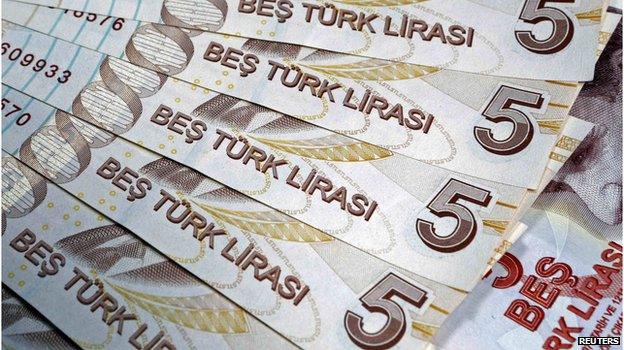The third horseman?
- Published
- comments

A more than doubling by the Turkish central bank of its main policy interest rate, from 4.5% to 10%, is the kind of evasive action reserved for serious crises.
In Turkey's case, what has been happening is that the Turkish currency, the Lira, has been falling sharply as capital has been leaving the country.
Similar capital flight and currency weakness has been seen in many of the world's emerging markets, from South Africa to Argentina to India.
Because they have been growing fast, they sucked in money from investors when most of the developed economies, like ours, became mired in recession and cut interest rates to record low levels.
Now that economies such as the US and UK are recovering, and interest rates are expected to rise here again, that money is leaving places like Turkey and India - causing their stock markets and currencies to fall sharply, thus importing inflation (via a falling currency) and engendering instability in their economies.
Following the banking crisis of 2008 and the euro crisis of 2010, some see what's happening in the world's less mature economies as the predictable start of the third leg of the global financial meltdown that began six years ago, or the third horseman.
It is a bit previous for such gloom, but what is the argument?
Well, in the era of financial globalisation, the painkiller for the mature economies, the creation of record quantities of cheap money, could never be hermetically sealed in the places that needed it most.
The surge of record cheap finance inevitably sloshed over into the developing and emerging world - stimulating them for a while, but creating the risk of cold turkey when the monetary stimulus was withdrawn.
And even though there are strict controls on capital flows from China, the creation of $15 trillion of bank debt there since 2008 has stimulated connected economies, especially in Asia.
Stories are legion of wealthy Chinese turning up in places like Singapore with suitcases full of cash - money always finds a way to flow to where the profits are best.
Which is why the Chinese government's haphazard attempts to remodel its economy, so that it becomes less dependent on debt-fuelled growth, is contributing to the anxiety and volatility in emerging markets.
How badly will it all end for the economies we admired as catching up with ours, while we trod water?
It is too early to say.
What will concern them is that their fate rests to an extent in the hands of a massively powerful financial institution, the US Federal Reserve, over which they have no influence and which has no responsibility to take account of their needs.
Later today we will learn whether America's central bank plans to increase the pace at which it cuts its purchases of US debt - thus speeding up the return to more normal monetary conditions and gently accelerating the rise in market interest rates.
In Turkey, India and South Africa, they may be hoping for something of a hiatus. But even if there is, they are aware that the developed West's putative recovery will continue to test the resilience of their currencies and economies.